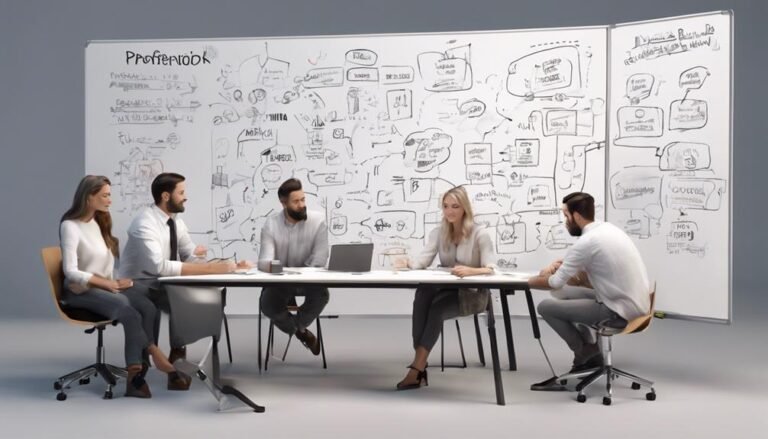Delegation as a Soft Skill
Mastering delegation as an essential soft skill is crucial for your growth and success. It involves assigning tasks effectively to enhance team efficiency and productivity. By distributing tasks based on strengths, leaders can focus on high-priority responsibilities, fostering empowerment within the team. Delegating also enhances communication, prevents errors, and promotes teamwork. Trust and collaboration play key roles in successful delegation, along with setting clear expectations and developing team skills. Overcoming challenges is possible through clear communication, time management, and accountability. Empowering team members leads to growth and skill development. Learn more about delegation strategies and its impact on organizational culture.
Key Takeaways
- Delegation enhances collaboration and teamwork.
- It demonstrates trust and empowers team members.
- Delegation nurtures leadership and communication skills.
- It fosters efficiency and productivity in teams.
- Delegation promotes a culture of accountability and growth.
Importance of Delegation
Understanding the importance of delegation is essential for effective leadership and team productivity. By assigning tasks appropriately, you can greatly enhance the efficiency of your team. When tasks are distributed based on individual strengths and expertise, it leads to improved efficiency as team members can focus on what they do best. Delegation also allows you, as a leader, to concentrate on high-priority tasks that require your attention, thereby increasing overall productivity.
Moreover, effective delegation fosters a sense of empowerment among team members. When individuals are entrusted with responsibilities, it not only boosts their confidence but also motivates them to perform better. This empowerment can result in increased productivity as team members feel a sense of ownership over their tasks. Additionally, delegation promotes skill development and growth within the team, as individuals have the opportunity to take on new challenges and expand their capabilities.
Essentially, mastering the art of delegation is crucial for achieving improved efficiency and increased productivity within your team.
Benefits of Effective Delegation
Maximizing team efficiency and productivity hinges on mastering the art of effective delegation. By delegating tasks appropriately, you can greatly increase productivity within your team. Effective delegation allows you to distribute work according to each team member's strengths, skills, and expertise, ensuring that tasks are completed efficiently and to a high standard. This not only lightens your workload but also empowers team members to take ownership of their responsibilities, leading to a more engaged and motivated workforce.
Furthermore, improved communication is a key benefit of effective delegation. Through clear delegation, you set expectations, provide guidance, and establish open lines of communication within the team. This clarity helps prevent misunderstandings, reduces the likelihood of errors, and fosters a collaborative environment where team members feel comfortable seeking clarification or assistance when needed. Ultimately, by mastering the skill of effective delegation, you can drive increased productivity and enhance communication within your team.
Trusting Your Team
To cultivate a high-performing team, it's essential to trust your team members with delegated tasks and responsibilities. Building trust within your team is the cornerstone of effective delegation. When you trust your team, you're demonstrating confidence in their abilities, which in turn boosts their morale and motivation. Trust is a two-way street; by trusting your team, you also encourage them to trust you as their leader.
Fostering collaboration is another vital aspect of trusting your team. When team members trust each other, they're more likely to collaborate effectively. Collaboration leads to increased productivity, innovation, and a sense of unity within the team. Encouraging an environment where team members trust one another creates a safe space for sharing ideas, giving and receiving feedback, and working together towards common goals.
Setting Clear Expectations
Establishing clear expectations is crucial for successful delegation within a team, guaranteeing that tasks are understood and executed efficiently. Effective communication is essential to this process, as it allows for a mutual understanding of what needs to be accomplished. By clearly outlining goals, deadlines, and desired outcomes, you set boundaries that help team members understand their responsibilities and the scope of the task at hand. This clarity promotes accountability, as each team member knows what is required of them.
| Expectation | Importance | Outcome |
|---|---|---|
| Clearly defined tasks and responsibilities | Ensures alignment with goals | Reduced confusion and errors |
| Transparent deadlines | Facilitates prioritization | Improved time management |
| Open channels for feedback | Encourages improvement | Enhanced performance and growth |
Developing Others Skills
Enhancing team members' skills is vital to fostering growth and productivity within the group. Building confidence in your team is essential for their development. One effective way to achieve this is by providing opportunities for skill-building exercises and training sessions. Encourage team members to take on new challenges that align with their interests and career goals. By doing so, you not only enhance their skills but also boost their confidence levels.
Fostering growth in others requires a supportive and encouraging environment. Offer constructive feedback regularly to help team members identify areas for improvement and provide guidance on how to enhance their skills further. Recognize and celebrate their achievements to motivate them to continue developing their abilities.
Moreover, consider creating mentorship programs within your team. Pairing team members with more experienced colleagues can provide valuable learning experiences and insights. This not only aids in skill development but also fosters a sense of community and collaboration within the group. Ultimately, investing in developing others' skills leads to a more competent and cohesive team.
Overcoming Delegation Challenges
To effectively overcome challenges in delegation, it's vital to establish clear communication channels and set transparent expectations from the outset. Effective time management is essential in delegation processes. Make sure tasks are clearly defined, deadlines are communicated, and priorities are set to streamline workflow. Open lines of communication enable team members to seek clarification, provide updates, and address any obstacles promptly.
Accountability plays a significant role in overcoming delegation challenges. Clearly define roles and responsibilities to avoid confusion and prevent tasks from falling through the cracks. Regular check-ins and progress updates help maintain accountability and ensure tasks are on track.
Productivity can be enhanced through effective delegation. By delegating tasks according to team members' strengths and workload capacity, you can optimize productivity levels. Encourage feedback from team members on the delegation process to identify areas for improvement and refine strategies for future tasks.
Empowering Team Members
Empower your team members by fostering a culture of trust and autonomy within your organization. Team autonomy is vital for skill development and growth. Encourage your team to take ownership of their work, make decisions, and solve problems independently. By giving them the freedom to operate within set boundaries, you promote a sense of responsibility and accountability.
Empowerment is the key to unleashing your team's full potential. Provide opportunities for them to showcase their strengths, take on new challenges, and contribute their ideas. Collaboration among team members is essential for fostering a supportive environment where everyone feels valued and respected. Encourage open communication, active listening, and a willingness to learn from one another.
As a leader, your role is to guide and support your team while allowing them the space to thrive. Recognize and celebrate their achievements, provide constructive feedback, and offer resources for further development. By empowering your team members, you create a motivated and engaged workforce that drives success for the organization.
Delegating Vs. Micromanaging
When delegating tasks to your team members, it's vital to strike a balance between providing guidance and allowing autonomy to avoid falling into the trap of micromanaging. Delegating autonomy involves assigning tasks while giving individuals the freedom to approach them in their way, fostering creativity and ownership. Micromanaging, on the other hand, is characterized by excessive control and monitoring, which can stifle innovation and demotivate team members.
By delegating effectively, you empower your team, encourage growth, and build trust. Avoiding control is essential for fostering a positive work environment where team members feel valued and capable of making decisions. Trusting your team's abilities and providing support when needed is key to successful delegation. Remember that micromanaging can hinder productivity and diminish morale, whereas delegating with autonomy can lead to increased engagement and improved outcomes.
Strive to delegate responsibilities while offering support and guidance, allowing team members to flourish while maintaining accountability. Balancing delegation with autonomy is a skill that can enhance team performance and contribute to a more positive and collaborative work environment.
Creating a Culture of Delegation
Building a culture of delegation within your team requires clear communication and a shared understanding of responsibilities. To achieve this, it's essential to build trust among team members. Trust is the foundation on which effective delegation stands. When team members trust each other and their leader, they're more willing to take on tasks and responsibilities, knowing that support and guidance are available if needed.
Fostering growth is another vital aspect of creating a culture of delegation. Encouraging team members to step out of their comfort zones, take on new challenges, and learn from their experiences contributes to both individual and team development. Providing opportunities for skill development and offering constructive feedback help team members grow professionally and personally.
Conclusion
To sum up, mastering the art of delegation is like conducting an orchestra where each member plays a crucial role in creating a harmonious symphony.
By entrusting tasks to your team, setting clear expectations, and empowering them to excel, you not only share the workload but also foster growth and development.
Embrace delegation as a soft skill to cultivate a culture of trust, collaboration, and success within your team.








